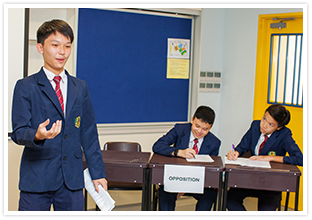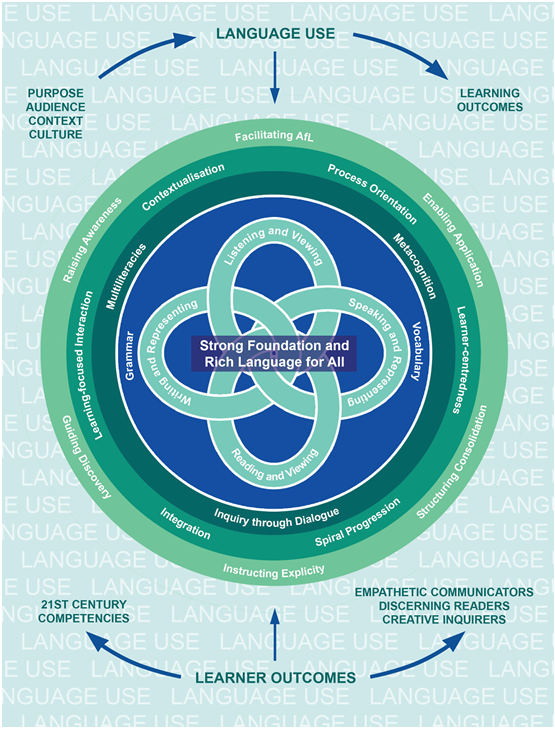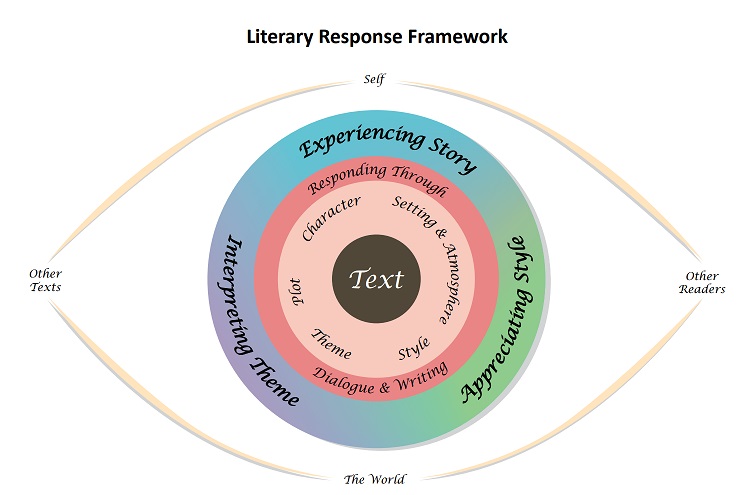English Language and Literature
Mission
-
To equip every Montfortian with the English Language skills necessary to express their thoughts, feelings and ideas clearly, effectively, and affectively in standard English.
-
To develop in every Montfortian an appreciation of the subtlety and beauty of the English Language, through an exposure to a range of multimodal texts.
-
To engender in every Montfortian the spirit of curiosity and inquiry, as well as the capacity to critically discern what they read, watch and write, through a diversity of learning experiences.
Our Team
Head of Department – Ms Seah Wan Cheng
Head of Department / Special Educational Needs (SEN) – Mr Lee Beng Wah
Teacher – Mr Ainsley Liew
Teacher – Mr Azman Bin Akmad
Teacher - Mr Brendan Hoe Qing En
Teacher - Mr Hector Tan Teck Huat
Teacher - Mr Joshua Ho Jin Teck
Teacher - Ms Megan Tan Shu Ning
Teacher - Ms Preetha Preklathan
Teacher - Ms Yogeswari Elangovan
Teacher - Ms Lo Cai Yue Brenda
Teacher - Ms Gan Jia Lin
Instructional Programme

The English Language Programme is critically conceptualised and carefully curated, anchored firmly on the principles laid out in the English Language Syllabus 2020. It is centred on the six Areas of Language Learning (AoLL), specifically, Listening and Viewing, Reading and Viewing, Speaking and Representing, Writing and Representing, Grammar and Vocabulary, and with pedagogical emphases on Multiliteracies, Metacognition, and Inquiry through Dialogue. These areas of learning are encapsulated through the range of learning experiences carried out across the levels and streams.
At every level, students explore English Language learning through thematic lenses from the self and individual at sec one, to issues of global concern such as sustainability and technology at upper secondary. They will develop all the skills necessary for communication and language competency by interacting with rich texts and being provided with the opportunities to use and apply the language in authentic settings, through fun and collaborative ways.
A blended pedagogical approach is taken to language learning, with a wide range of digital and traditional resources utilised in, and out, of the classroom. Google Classrooms and Student Learning Space are part and parcel of the lived learning experience, and with their personal devices, students can explore more facets of learning, both collaboratively and independently.
To further pique the interest of our students in the English Language, alternative assessments are an indelible part of their assessment for learning. They will have platforms to apply their knowledge and skills learnt in an authentic setting each semester; from the vlogs at secondary one, to the mini TED-talk style presentations at secondary two, students are challenged to interact with the language in a diversity of ways.
To ensure that our students broaden their perspectives, our Reading Programme is implemented at all levels of study. Students are to bring a story book to read every day before morning assembly, enjoying the stories while acquiring the language inductively. We have class library books for loan and digital copies of The Straits Times to keep them updated on current affairs in both Singapore and the world. Furthermore, our Read Watch and Write resources provide them with a rich resource for learning which widens their horizons and stretches their thinking. Every fortnight, reading articles and videos are shared, with insightful questions for them to reflect on, building their content knowledge and developing their critical thinking faculties.

English Language Communications Programme (ECP): Journey with us on the highway of effective English Language Communication!
Our core EL programme is augmented by the ELL Department’s signature EL Communications Progamme (ECP). It provides additional platforms for out-of-classroom authentic learning experiences for our students across their 4 years of study. The programme is designed to be a spiral of skills – from the self, to the school, community, and into the future. All artefacts are showcased at various junctures during the school year, and on the school’s online publication, ‘Kaleidoscope’.
In secondary one, our students will be taught the fundamentals of creating their own video-logs (vlogs) and tasked to create their very own vlog on a subject of interest to them. This develops their digital literacy skills which are necessary in the new economy, as well as provide them the affordance of speaking and presenting a piece to camera, building their oracy skills.
In secondary two, our Young Journalists @ Montfort (YJ@M) provides select students with journalism skills, which will see them cover class and school events across the school year. This gives them the opportunity to build greater confidence in speaking and interacting with others and takes them further out of their comfort zones. In secondary two and three, we will also see the debating and public speaking initiatives take root, where students are given the fundamentals of debating and public speaking and compete in the intra and inter-class debating championships. Their oratorical skills will be put to the test, and their ability to persuade, convince, and perhaps even exhort, their peers and teachers will be stretched.
Our graduating students will end their journey on the ECP with workshops on future skills such as interview skills and social etiquette. These will aid in preparing them for their next phase of educational endeavours, as well as groom them to be the fine, young gentleman that is the hallmark of a Montfortian.
English Literature:The school-based curriculum is closely aligned to the English Literature Syllabus 2019 and anchored by the Literary Response Framework. Texts come alive in the Literature classroom as our team of passionate teachers make manifest the words on the pages of the books we study. All students will be given exposure to the three literary genres of Prose, Poetry and Drama in their course of study with us in the lower secondary programme, while Pure Literature is offered to upper secondary students who have an interest and proclivity for the discipline.
In the lower secondary programme, students will be taken on a harrowing journey through the eyes of a young boy living through World War Two in the novel The Boy in the Striped Pyjamas. Thereafter, they will have the opportunity to bring to life plays set in our Singaporean context in the text Something Old, Something New, Something Borrowed. In addition, they will also delve into a range of poems across contexts, both local and foreign, to explore complex ideas nestled within the beauty of words.
In the upper secondary programme, students will take a deeper dive into all three genres of study, and explore more complicated concepts and complex ideas, all while developing their appreciation of the craft of writing. Students will read one prose text, one drama text, and a compendium of poems in their two years of study. They will be tasked to immerse themselves into the world of the texts and from there, actively construct meaning and make connections between the texts, their lives, and the world.
Beyond the classroom, we have a range of literary learning experiences which our students will have the opportunity to be a part of. We organise annual learning journeys to various places of literary interest, we invite drama practitioners to run Drama Workshops for our boys during the school’s LearnFest, and our upper secondary students have the opportunity to watch a play and interact with the cast and director as part of their Drama Experience. Our students also have the chance to interact and learn from local authors and playwrights through various events organised throughout the year, as well as our annual participation in the National Schools Literary Festival (NSLF).
The creative endeavours do not stop at learning experiences, they have also found their way into the realm of assessment. We believe that our students express themselves in a variety of ways and as such, we have constructed meaningful alternative assessments such as Poetry Writing, and even song composition (in collaboration with the music programme).
Through all these learning experiences, we seek to empower students to actively construct meaning in texts and see themselves and the world from diverse perspectives, to find their own voice as they reflect on the human condition with discernment, and to consider the impact of their beliefs and actions on society. Most of all, we hope to build empathy in all who pass through our doors; to have in them the capacity to see the world through the eyes of others, and to share in the common human experience, upon which hangs the very thread of our shared humanity.


